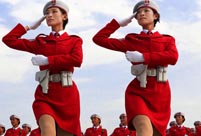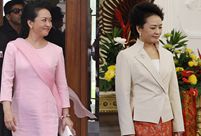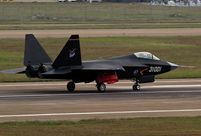 Bikini show in 2014 China Final of Miss Tourism World
Bikini show in 2014 China Final of Miss Tourism World
 Close-up view of August Aerobatic Team
Close-up view of August Aerobatic Team
 Goddesses married in 2014
Goddesses married in 2014
 Polar region photos raise worldwide awareness of global warming
Polar region photos raise worldwide awareness of global warming
 Get off at the last stop — Beijing Subway in vision
Get off at the last stop — Beijing Subway in vision
 Top 100 beauties in the world!
Top 100 beauties in the world!
 Gallery: Who is the most beautiful one?
Gallery: Who is the most beautiful one?
 If you like autumn, put your hands in the air!
If you like autumn, put your hands in the air!
 Fan Bingbing's "Queen style" in new play
Fan Bingbing's "Queen style" in new play
 Lingerie show at 2014 Miss China
Lingerie show at 2014 Miss China
TOKYO, Dec. 14 -- The passing year has witnessed continued chill in Japan's relations with major neighboring countries, mainly China, South Korea and Japan, a trend rarely seen in the country's post-war history.
Besides territorial disputes, Prime Minister Shinzo Abe and some other Japanese politicians have angered neighboring countries with ultra rightist remarks and actions, such as whitewashing Japan's atrocities and attempting to revise its pacifist constitution, observers said.
RELATIONS FREEZE
Abe, who took office for a second term in 2012, has since carried out a so-called "value diplomacy with a global perspective" by visiting some 50 countries in two years, the most by a prime minister in Japan's history.
However, the Achilles' heel of the ambitious diplomacy is that Abe has failed to properly handle ties with Japan's three most important neighbors, namely, its largest trade partner China, South Korea, an important U.S. ally in the region, and Russia, Japan's potential fuel supplier.
Following Japan's "nationalization" of disputed Diaoyu islands, its relations with China have already sunk to a new low, with no formal bilateral meetings nor exchange of visits between state leaders ever since.
The ice was somehow cracked when Abe, while attending the annual APEC leader's meeting, met briefly with Chinese President Xi Jinping in Beijing after the two sides reached a four-point agreement on bilateral relations.
However, Sino-Japanese ties are far from normalization since the Japanese government has yet to fulfill its pledge to properly handle issues of war history and territorial disputes, observers say.
Japan's relations with South Korea are caught in similar downward spiral. Except for a few courtesy talks on the sidelines of international conferences, South Korean President Park Geun-hye refused to hold formal summit with Abe.
What humiliated Abe further was the cancellation of a planned visit by Russian President Putin after Tokyo followed its Western allies with sanctions against Russia, which also snagged the bilateral energy cooperation the oil-poor Japan needed badly.
RIGHTISM REIGNS
While all three countries have territorial disputes with Japan, what seems to worry them more is the rightward shift in Japan endorsed by Abe.
Abe, who called for an early general election to test voters' support for his economic policies, has an undeclared agenda to win the legislative battle of revising a key clause of the post-war constitution in his prolonged term, according to political analysts.
Article 9 of the Constitution maintains that Japan has renounced the right to war or resort to threat of force in settling international disputes.
Earlier this year, the Abe cabinet demonstrated the intention to skirt the clause by passing a resolution that permits Japan's forces "the right to collective self-defense", an euphemism for allowing Japanese military buildup and participation in wars abroad.
"Abe's decision to have his cabinet reinterpret Article 9 of Japan's peace-promoting Constitution, certainly rocked relations between Japan and its neighbors," David McLellan, a former professor on Asian Studies in Tokyo, told Xinhua.
"Remilitarizing the country is a vital part of Abe's legacy - one which sees an expanded role of Japanese troops both at home and overseas," he said.
Furthermore, the rightist nationalistic trend was also evident in repeated visits of Yasukuni Shrine by Japanese politicians and their attempts to whitewash war atrocities by Japanese forces in World War II (WWII).
The prime minister, who visited the shrine in late 2013 and presented it a gift this year, has never restrained his cabinet ministers from paying homage to the shrine, where Japan's Class-A war criminals are worshipped.
To the outrage of South Korea, the Abe cabinet conducted a review and denied the facts underlining the Kono Statement, in which Japan apologized for and acknowledged its forced recruitment of Korean women as wartime sex slaves.
"Abe over the course of this year has unapologetically steered the nation further and further down a well-trodden path of nationalism that celebrates militaristic fundamentals and ideologies," said Laurent Sinclair, a Pacific affairs analyst.
FUTURE TIES WITH NEIGHBORS
Improving future ties are both important for Japan and its neighboring countries, as they are closely intertwined economically, but the prospect of improvement depends on Japan's attitude towards its correct understanding of the war-time history, which all the three neighboring countries have taken seriously, analysts say.
China and Russia have already announced their intention to solemnly celebrate the 70th anniversary of victory of allied countries in WWII.
Hisashi Inoue, a history expert at Surugadai University in Japan's Saitama Prefecture, told Xinhua in a recent interview that "Japan and China will face a lot of new issues in many areas such as economics, but before handling new issues, the two countries have to properly deal with existing problems stemming from history."
"To achieve reconciliation, Japan must admit its responsibility for its wartime wrongdoings and offer a sincere apology. If Japan denies history and refuses to reflect on its past, mutual trust between the two countries will be baseless, not to mention other deadlocked issues," said Inoue.
(For the latest China news, Please follow People's Daily on Twitter and Facebook)
 20 years on: Relocated Three Gorges residents through lens
20 years on: Relocated Three Gorges residents through lens PLA HK Garrison veterans leave behind beautiful smiles
PLA HK Garrison veterans leave behind beautiful smiles Representative beauties of each province in China
Representative beauties of each province in China Chestnut girl goes viral online
Chestnut girl goes viral online Victoria's Secret Fashion Show
Victoria's Secret Fashion Show In photos: Bright and brave female soldier of PLA
In photos: Bright and brave female soldier of PLA China's charming first lady
China's charming first lady Excellent photos of Zhuhai Air Show
Excellent photos of Zhuhai Air Show China's heavyweight aircraft
China's heavyweight aircraft Society needs consensus on street politics
Society needs consensus on street politics Policy bank plan gets mixed reaction
Policy bank plan gets mixed reaction  Shopaholics
Shopaholics  Hungry moments
Hungry momentsDay|Week|Month